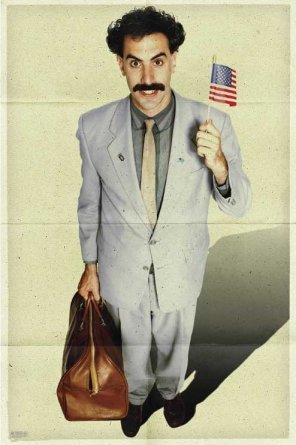Borat:
Cultural Learnings of America for Make Benefit Glorious Nation
of Kazakhstan
Jagshemash! Fans of Sacha Baron Cohen, better known as Ali
G, Borat Sagdiyev, or Bruno from Da Ali G Show
on HBO, can finally rejoice. The much anticipated and maligned
comedy depicting everyone’s favorite Kazakh reporter,
sex fiend, and Jew hater’s exploits in America has
finally come to the big screen.
Cohen
skewered American culture on HBO for two seasons as Ali
G, Borat, and Bruno. However, with Borat: Cultural Learnings
of America for Make Benefit Glorious Nation of Kazakhstan
the "guerrilla comedian" ups the ante by using
the first act of the film to lull unsuspecting viewers into
acceptance before blasting away at our nation full of idiots.
For
the uninitiated, or if you’ve been living under a
rock, Borat Sagdiyev is a fictional character from Kazakhstan
– a reporter sent to the United States to learn all
about American culture. In the HBO series, Borat would interview
a variety of personalities ranging from politicians to self-help
gurus in hopes of better understanding the inner workings
of the United States.
His
naïve mannerisms mix with his sexual obsessions and
exaggerated perspectives of his village in third world Kazakhstan
– a life of grossly misreported stereotypes of Kazakh
culture. According to Borat, Kazakh women are slaves, gypsies
threaten the people’s livelihood, and Jews are demons
deserving of persecution. Imagine the expressions on politician’s
faces when Borat offers to share pictures of his sister,
the number three prostitute in Kazakhstan.
Borat’s
interviews were peppered with his obtuse musings, and to
spell out “the joke” would be too obvious. You
either get it, or you don’t. A hint, however, is that
Borat’s mannerisms are not Cohen’s aim. He’s
gunning for the responses of his unsuspecting subjects,
and our puritanical misgivings make us ripe cultural fodder.
The
film frames live events involving Cohen acting out scenarios
with unsuspecting subjects with the fictionalized construct
of Borat’s journey to California in search of, you
guessed it, the American dream.
Fans
of the show might find the pacing of the first act to be
a bit too much of a retread, but it is more than necessary.
Cohen isn’t setting his sights merely on pleasing
the rabid fans of his character. Instead, he’s aiming
at each and every person in the audience.
Leaving
behind destitution and stings reporting at the annual “Running
of the Jew” celebration, Borat makes his way to the
U.S. while accompanied by a documentary crew – most
notably his producer Azamat Bagatov.
While
the first act intends to lure the unsuspecting into Cohen’s
trap, the second act turns the screws on even the most diehard
fans. I was lucky to attend a screening full of fans of
the show, including a gaggle of pro football players from
the East Bay who entered the screening quoting the titular
character with impressive impersonations. These guys were
no stranger to Cohen’s character and comedy, but somewhere
in the second act the roaring laughter in the cinema turned
a touch more uneasy and a touch more unsure.
Why?
I can’t say. Actually, I shouldn’t say. Or,
better yet, I won’t say.
Simply
put, Borat must be experienced. With all of the hype, controversy,
and hoopla surrounding the real-life Cohen, the Kazakhstan
government, and the fictional Borat, it’s amazing
to think that some of the key stints from the film haven’t
really been leaked or seen the light of day…yet.
So while
the rest of the world bustles into theaters on Friday to
witness Borat’s celluloid exploits for the first time,
I’ll be sitting at home, thinking of that hotel sequence,
and picturing the audience squirm in disbelief and discomfort.
I’ll picture that group of uncomfortable audience
members who left the screening puzzled, and I’ll smile.
Then I’ll grab a ticket and watch the film…again.
Wawaweewah!
Rating:

(for
the British perspective, click here)
|








